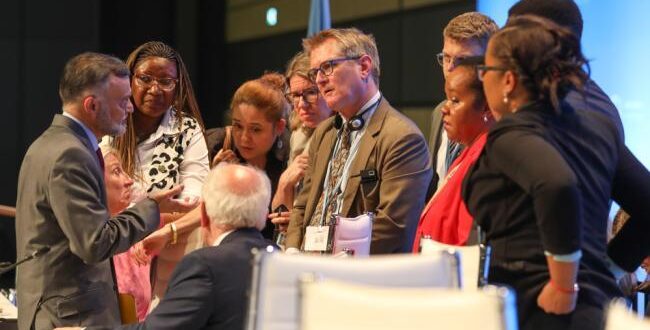INTERMEDIATE NEGOTIATIONS INTO CAOS
If COP27 taught us that the inclusion of an unexpected item on the agenda can change the history of international negotiation, the current interims in Bonn tell us that we had seen nothing yet.
At the end of last week, after days of negotiations that continued without an agenda of work being formally approved by the participating delegations, we had gone so far as to write that the second week would certainly see a settlement of, how shall we say, the different views, so as not to frustrate the negotiation. We mentioned this in this article and our COP Bulletin from Bonn. Unfortunately, what took place on Monday along the Rhine confirmed the climate of unprecedented chaos that reigns over the climate negotiations.
In the afternoon, the presidents of the plenary – that is, those who manage the whole of the work, of all the technical tables – tried to reconvene the assembly to see if the delegates had managed to agree over the weekend after phone calls and meetings with their capitals and, as often happens, more or less public lunches and cafes around the conference centre. Instead, those of us who believe in the process witnessed the repetition, now perhaps more vehemently than ever before, of the clash between the global North and South that had characterised the first week and all negotiations from Bonn 2022 onwards, with one novelty.
Until last Saturday, the problem behind the non-adoption of the agenda lay in the refusal of the countries of the global South, led by China, to formally include the Mitigation Work Programme (MWP) among the issues to be worked on before the submission of the relevant pre-session technical reports, and in the absence of serious commitments from developed countries on the issues of adaptation and finance for adaptation, climate finance in general, and loss and damage compensation.
As if this were not enough, between Friday and the start of the second week of negotiations, the Like-Minded Developing Countries group (LMDC, consisting of Algeria, Bangladesh, Belarus, Bhutan, China, Cuba, Egypt, India, Indonesia, Iran, Malaysia, Myanmar, Nepal, Pakistan, Philippines, Sri Lanka, Sudan, Syria, Vietnam and Zimbabwe) surprisingly proposed to include an item on financial support for mitigation actions by rich countries under Article 4.5 of the Paris Agreement on the agenda. All other developing countries immediately supported the proposal – they had certainly coordinated on this before. In contrast, the United States of America and the European Union branded the new proposal as ‘not serious’.
But what are the criteria according to which one can decide to add or remove items from the agenda? Rule 13 of the UNFCCC Rules of Procedure says that ‘only items that are considered by the COP to be urgent and important may be added to the agenda of the proceedings’.
How should one judge whether the item on financial support to countries of the South is ‘urgent and important’? The LMDC countries refer to Article 4.5 of the Paris Agreement, which – in conjunction with the previous paragraph, 4.4 – reads:
“4. Developed country Parties should continue to take the lead by setting absolute emission reduction targets covering all sectors of the economy. Developing country Parties should continue to enhance their mitigation efforts and are encouraged to assume, over time, emission reduction or limitation targets that cover all sectors of the economy, in light of different national circumstances.
5. Developing country Parties shall receive support for the implementation of this Article, following Articles 9, 10 and 11, as it is recognised that increased support for developing country Parties will enable their actions to be more ambitious.”
For years now, as LMDCs tell us, all final COP decisions cite the urgency and importance of raising the global ambition on mitigation, with developed countries now wanting to insert, in their view too hastily, a compulsory work item on new mitigation targets that are very costly to implement on the ground. Considering this, it can be considered ‘urgent and important’ to decide already in these interim negotiations in which sense the rich countries will financially support this transition and its further developments. Simple, don’t you think?
The explanation provided by the LMDC countries in support of their proposal can be found in this letter, which went on record a few hours ago. Our volunteer Elisa Terenghi was present at the plenary and reported a climate of great nervousness, with the Colombian, Cuban and Chinese delegates particularly agitated and strong words chanted into the microphones (‘broken promises’, ‘broken commitments’), with the European Union and Switzerland continuing until the end to reiterate their opposition to any agenda proposal that did not explicitly include a strand on the Work Programme on Mitigation. Finally, the session was closed by one of the two chairs: ‘I feel like I’m in primary school’.
As is often the case, the pragmatism of the Chinese delegation, heard again by our volunteer Terenghi: ‘Why do we support this new agenda item as important? Simply because they [the Westerners] failed to get a negotiating mandate on the issue of financial aid from their capitals at the last COP. Why do we consider it urgent? Because they [the Westerners] were never allowed to talk about finance in the interim negotiations, despite much talk about the needs of global finance for the climate’. A clear and direct message. A political clash that keeps the intermediate negotiations in chaos even in the beginning of this second – and at least by schedule last – week.
Article by Jacopo Bencini, Policy Advisor and UNFCCC Contact Point

